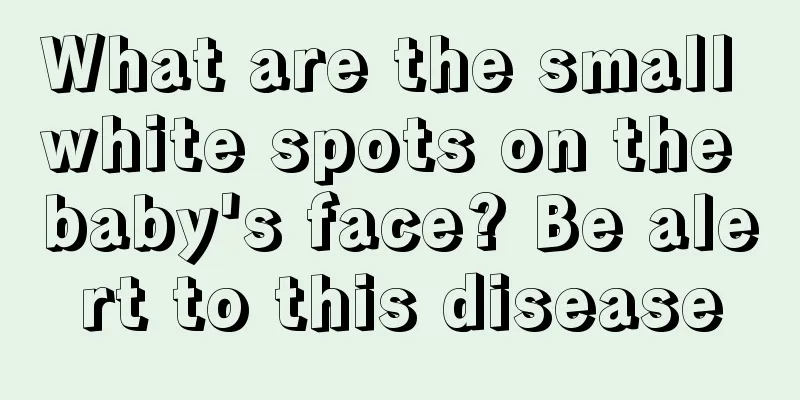Is it normal for newborns to have shortness of breath sometimes?

|
In daily life, for many newborn babies, the respiratory system is not well developed and the breathing rate is very fast. Young parents take care of their babies for the first time. Whether it is feeding the baby or taking care of the baby's body, they need to observe carefully. So many parents will worry about whether it is normal for newborns to breathe rapidly sometimes? What kind of impact will it have on the body! Children have vigorous physiological metabolism, and their oxygen demand calculated based on body surface area is close to that of adults. Children can generally only meet the body's needs by increasing the number of breaths. The younger they are, the higher their breathing rate. A normal newborn breathes 40 to 44 times per minute; for children under 1 year old, it is 30 times; for children between 1 and 3 years old, it is about 24 times per minute. To observe the number of breathing times, it must be done in a quiet or sleeping state to be accurate. An increased respiratory rate is a characteristic sign of pneumonia in infants and children under 3 years of age. In mild pneumonia, the child coughs, becomes short of breath, and has a faster respiratory rate. For children under 2 months old, the respiratory rate is more than 50 times per minute, for children aged 2 to 12 months, the respiratory rate is 40 to 50 times per minute, and for children over one year old, the respiratory rate is greater than 40 times per minute. In severe pneumonia, the heart rate is more than 60 times per minute for children under 2 months old, greater than or equal to 50 times per minute for children between 2 and 12 months old, and greater than or equal to 40 times per minute for children over one year old. If the baby lies flat on the bed immediately after feeding, milk will flow out from the corners of the mouth, and the baby may even spit out all the milk he has just eaten. However, if you hold your baby upright for a while after feeding and then put him/her in bed, spitting up will be significantly reduced. In medicine, this kind of spitting up is called regurgitation. Why do babies spit up milk? The stomach of a child is horizontal, with a straight bottom, and the contents can easily overflow. After standing and walking, the diaphragm descends and the effect of gravity gradually turns it into a vertical position. In addition, the baby's stomach capacity is small, the stomach wall muscles and nerves are not yet fully developed, and the muscle tone is low, all of which can easily cause milk regurgitation. The sphincter of the cardia (near the esophagus) of the baby's stomach is not as well developed as that of the pylorus (near the duodenum), which makes the stomach's outlet tight and the entrance loose. When the baby lies flat, the stomach's contents can easily flow back into the esophagus and overflow with milk. Improper feeding methods, excessive feeding, inverted nipples, empty bottles, or nipples that are not full of milk can all cause the baby to swallow a lot of air and spill milk. Frequent changes in body position after feeding can also easily cause milk to spit up. Spitting up is completely preventable. For bottle feeding, the nipple opening should be of the right size and the nipple must be filled with milk. If the mother has inverted nipples, they should be corrected during pregnancy. After feeding, the baby should be gently picked up, with the head resting on the mother's shoulder, and the baby's back should be patted gently to expel the air in the stomach. If the milk regurgitation is caused by the relaxation of the cardia and incomplete closure function, the baby should be held upright for one or two hours after feeding, and then put on the bed with the head slightly raised. As the muscles in the gastric cardia develop fully, the symptoms of milk regurgitation will gradually ease. When a baby comes into the world for the first time and comes into contact with the outside environment for the first time, he or she may experience some minor symptoms because the body cannot adapt. You need to observe carefully. Many children breathe rapidly when drinking milk or sucking milk. This makes many parents worry. Is it normal for newborns to breathe rapidly sometimes? If you encounter such a phenomenon, it is recommended that parents take their children for examination in time. |
<<: Why do newborns sometimes have shortness of breath?
>>: What is the cause of gastroesophageal reflux in children?
Recommend
Two-year-old baby always itches
In the summer, mosquito bites are very common, es...
Why does my child have a cold and is sleepy?
When people have a cold, they always feel sleepy ...
Why does a child snore when sleeping?
Snoring is a very common thing. It can happen in ...
How to use yellow fruit to relieve jaundice
Yellow fruit, also known as gardenia, is a relati...
Early symptoms of rheumatic disease in children
Rheumatism is a very common disease in daily life...
Why does my baby's hair grow slowly?
Some babies' hair grows slowly after birth. A...
What are the physical methods for reducing fever in children?
Children are fragile, but they are bound to encou...
Can children use aloe vera gel on their faces?
Children can apply aloe vera gel on their face, w...
The 10 most effective rules for educating children
First Rule Establish results - direction is more ...
What are the dangers of yellow runny nose in children with colds
Colds and runny noses are common in children, but...
What are the ways to strengthen your baby's physique?
Many children often catch colds and fevers when t...
What is the matter with the baby's calves being bent?
Now we pay special attention to children's he...
What soup can children stew to enhance their physical fitness?
Children's bodies need more nutrients and tra...
What should I do if my child has prickly heat?
Prickly heat is the most common skin problem in c...
What should children with alopecia areata eat?
In today's life, the incidence of diseases is...









